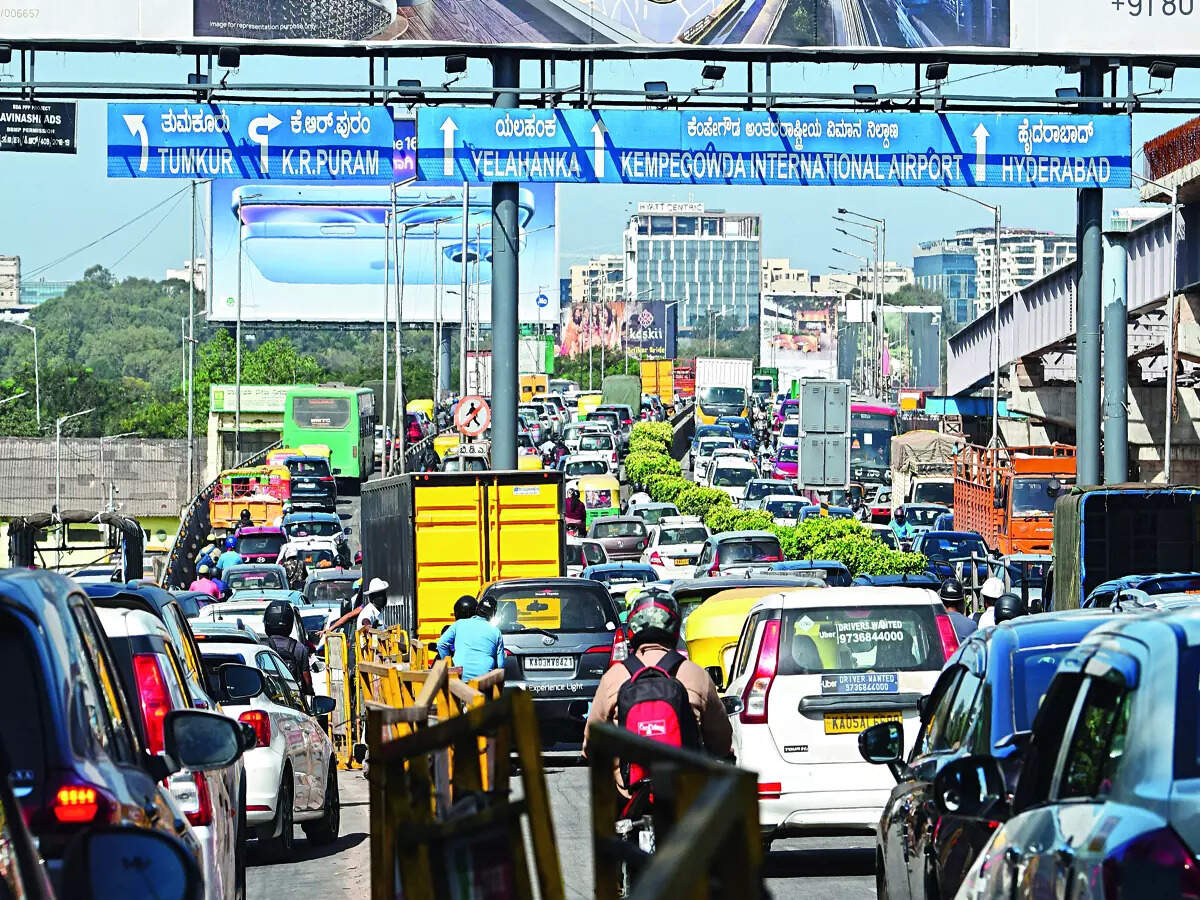Job Desperation, From Master’s Degrees To Fresh Graduates, No One Is Safe! Can India Handle The AI Disruption With Its Massive Workforce?

Jobs are far and few, especially considering Bengaluru, India’s tech hub, has been for years, the go-to destination for IT professionals. The city houses thousands of tech workers, many of whom reside in budget-friendly accommodations such as PG facilities or low-rent apartments. However, Bengaluru is on the brink of one of the most severe job crises in its history, driven by large-scale layoffs in the IT industry and the rapid surge of artificial intelligence and automation.
What is worse, is that this looming crisis will not just affect tech professionals, it will ripple through the entire city, impacting the housing market, property investments, small businesses, and even Bengaluru’s economic standing!
It’s a headwind that could reshape the city’s future in ways few had anticipated.
Means to Earning Diminishes
To put things into perspective, let us look at how brutally competitive the job market has become. A recent job posting for a Software Development Engineer at Blinkit, the quick-commerce platform, received an astonishing 13,451 applications in just 24 hours. This number alone is a testament to the desperation in Bengaluru’s IT sector.
A breakdown of the data showed that – 74% of applicants were entry-level professionals. 13% were senior-level candidates, indicating that even experienced professionals are struggling. 86% held a bachelor’s degree, and 12% had a master’s degree, showing that in the present, even higher qualifications are no longer a guaranteed pathway to employment.
Meanwhile, yet another case has showcased the urban unemployment crisis in Bengaluru. A tech graduate from the 2023 batch, struggling for nearly two years without a job, took to Reddit in desperation, offering to work for free just to gain experience.
His post, titled “Burn my resume but please help. Desperate & Ready to Work for Free Remotely – 23′ Grad Looking for a Job ASAP,” laid bare the grim reality. Despite holding a B.E. in Information Science and expertise in Java, Python, DevOps, Cloud Computing, and Machine Learning, he remained jobless.
These are no isolated incidents. Bengaluru’s IT professionals are facing an uncertain and unforgiving job market.

Further High Winds
However, what makes the matter worse is that in the coming months, Bengaluru is expected to witness large-scale layoffs in the IT sector, particularly among entry-level and low-paying employees. These employees, are the first to be axed when companies look to cut costs or adopt AI-driven automation.
AI tools can now code, debug, and automate tasks with remarkable efficiency, making low-tier software jobs redundant and companies are eager to replace human workers with AI-driven systems that are faster, error-free, and cost less in the long run.
Hence, for those who still have jobs, salaries are stagnating, and job security is no longer a given.
The PG Market Is on the Verge of Collapse
Bengaluru’s paying guest, PG facilities, which largely cater to entry-level IT employees, are expected to be hit hardest by this crisis. The equation is simple, fewer jobs mean fewer tenants, fewer tenants mean lower rental income. Many landlords, who purchased properties hoping for steady rental income from the IT workforce, are now finding themselves with vacant rooms and unpaid loans and this unfortunately may be the case going forward as well.
Real Estate Investors Face a Harsh Reality
Thus, areas like Marathahalli, Whitefield, and Electronic City, where PGs and shared accommodations are the norm, are expected to see a sharp rise in vacancies, causing a domino effect of financial stress among property owners.
For real estate investors, particularly those near Outer Ring Road (ORR) and IT corridors, the situation is grim. They have poured crores of rupees into properties banking on Bengaluru’s booming tech industry but with thousands of job losses and salary cuts, the demand for rental properties and real estate investments will shrink.
Investors banking on IT professionals as long-term tenants may struggle to find renters, leading to plummeting property values. Likewise, builders who targeted IT buyers with premium housing projects may see demand collapse, especially for apartments priced at ₹1 crore and above.
These developments could lead to a real estate slowdown, similar to what Gurugram witnessed when its IT sector faced downturns in the past.
Bengaluru’s Local Economy Will Feel the Burn
These developments not only signal financial losses, the mental health toll on IT workers is already becoming apparent.
Hence, Bengaluru could witness, a surge in job migration, with tech professionals relocating to other cities or countries in search of opportunities. Increased career shifts, with laid-off engineers taking up gig work, freelancing, or completely unrelated jobs to survive.
Bengaluru’s IT sector not only supports tech professionals but also fuels the city’s local economy.
Now, when mass layoffs occur, spending drops across, restaurants, cafes, and bars, fewer employees mean lower footfall. Less commuting, fewer cab and auto-rickshaw rides. A decline in disposable income also means cutbacks on spending.
Thus, a shrinking IT workforce could trigger a mini-recession in Bengaluru’s economy, affecting thousands of businesses beyond just IT.

How Did We Miss The Signs?
One reason this impending job crisis may not have caught the public’s attention yet is because most people underestimated the speed at which AI is transforming industries. Many assume AI is a futuristic threat, something to worry about years from now; however, in reality, the disruption is already happening, and Bengaluru’s IT professionals are on the front lines.
It is becoming painfully clear that automation is a productivity tool but its is also a replacement for low-level tech jobs. Tasks that once required human expertise, such as coding, debugging, and testing, are now being handled by AI tools faster, more accurately, and at a fraction of the cost.
The bottom line is that the jobs that entry-level engineers once relied on to gain experience are disappearing overnight.
Not Jut IT Alone
The effects of AI-driven job cuts aren’t confined to the IT sector. A storm is brewing across industries like finance, operations, and even chartered accountancy, where automation is gradually making human roles redundant.
For example – Financial analysis and audits?
AI tools can now scan, detect anomalies, and generate reports with better accuracy than humans.
Data entry and report generation?
Automated bots have already taken over a large chunk of the work.
Back-office operations?
AI-powered software is eliminating thousands of clerical roles in banking, insurance, and administration.
Hence, it is not surprising that with automation reducing the demand for human effort, even white-collar workers in non-IT fields are beginning to feel the squeeze.
AI Could Wipe Out 40-50% of White-Collar Jobs
Mumbai-based entrepreneur and Atomberg founder Arindam Paul has raised serious concerns about AI’s potential to cripple India’s white-collar job market.
In a recent LinkedIn post, Paul didn’t sugarcoat his warning – “I don’t think most people, including our leaders, understand how big a threat AI could be to our economy.”
According to the implications are severe. AI could significantly reduce employment in the IT services and BPO sectors. Meanwhile, India’s manufacturing sector is not strong enough to create new jobs to compensate for these losses.
Even though major IT firms like Infosys might adapt and even grow, they’ll employ far fewer people than they do today.
Paul predicts that 40-50% of white-collar jobs could vanish, leading to the collapse of India’s middle class, the very foundation of its consumer-driven economy.
The grim outline leads us to another important aspect – are corporates prioritizing profits over employment?
One might think that AI-driven layoffs are a natural consequence of technological progress, but the fact is, there is also a choice where many corporations are aggressively adopting AI, cutting human jobs, and boosting profit margins without considering the broader economic impact.
In other words, companies may win the short-term battle (higher efficiency, lower costs), but they could lose the long-term war (shrinking demand, economic downturns).
India is still heavily reliant on human-driven jobs and if AI replaces a large portion of the workforce without creating new opportunities, the country’s economic stability could be at serious risk.

How Serious Could This Get? Can India Afford This Crisis?
Let us now address the hard question – can India, with its massive population, afford to lose millions of white-collar jobs?
India’s IT and BPO sectors employ over 5 million people, even a 25% reduction would mean over 1 million jobs lost.
The middle class is the backbone of India’s consumer economy, if their incomes shrink, demand for housing, cars, electronics, and daily essentials will plummet.
India’s GDP growth could slow down dramatically, forcing a complete rethinking of employment strategies in the country.
The Last Bit.
Right now, there are few answers and fewer solutions. If Bengaluru is the first city to feel the heat, it won’t be the last. What is concerning is, despite these warning signs, the response from corporates and policymakers has been lukewarm.
Are IT firms acknowledging the problem?
Well, most are moving ahead with AI-driven restructuring without clear reskilling plans for employees.
Is the government stepping in?
Thus far, no major policy interventions have been announced to address the rising unemployment or assist job seekers in transitioning to other roles.
Are startups hiring?
While some smaller startups are absorbing talent, their capacity is nowhere near enough to offset the thousands of lost IT jobs.
If Bengaluru wants to retain its status as India’s Silicon Valley, urgent intervention is needed otherwise, the city that once built careers may soon become the epicenter of India’s next unemployment crisis.
And this crises may soon spread to other cities, thus the real question is, are we (India) prepared?



